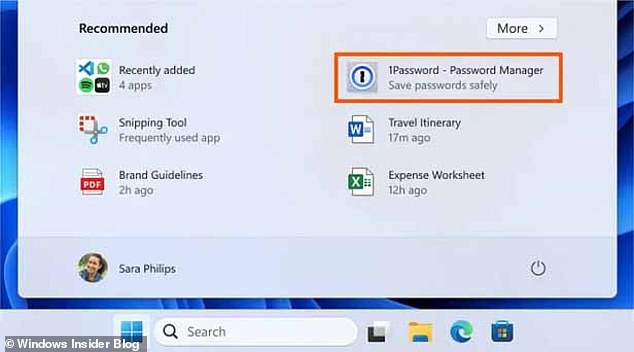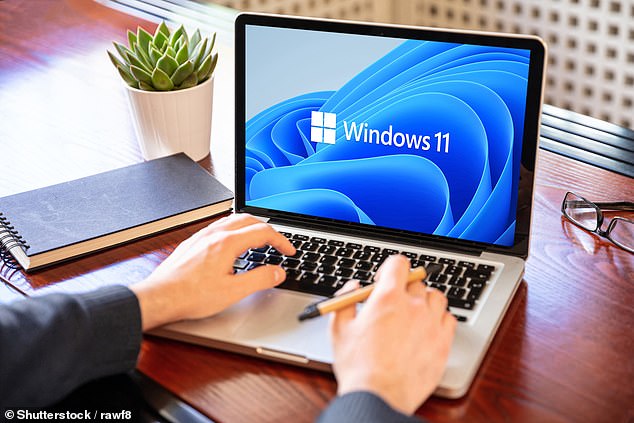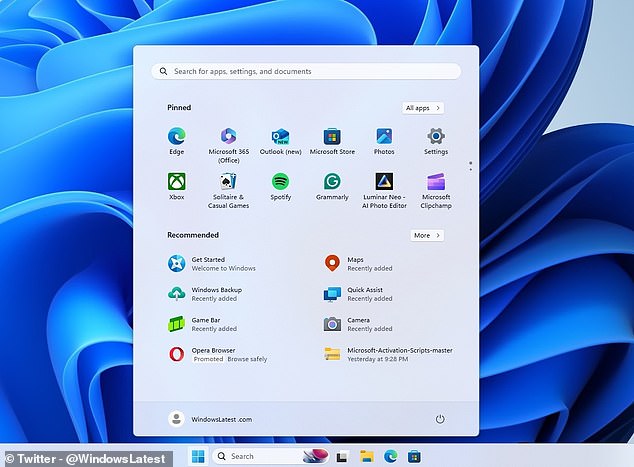From Netflix to Amazon Prime, more and more online services are starting to be filled with annoying promotions.
But now Windows users won’t even be able to open their Internet browser before seeing ads.
Microsoft will soon start including ads in the Windows 11 Start menu with the inclusion of “recommended” apps.
On social media, Windows users have been outraged by the decision to include ads in the operating system that they have already paid £119.99 ($139) to access.
Fortunately, there is an easy way to turn off annoying ads with a simple change to your device settings.
Windows 11 will now include ‘recommended’ app ads in the Start menu; Fortunately, there is an easy way to disable them. This image shows how a promoted ad for ‘Opera Browser’ is included

Windows users have expressed their frustration on social media, complaining that it’s “crazy” to receive ads on an operating system they’ve already paid for.
This change is part of the KB5036980 update that was released for Windows this week.
Although the update is currently optional, it will soon roll out to all Windows devices in the coming weeks.
However, if you choose to install the new update or receive it as it rolls out, ads can be easily disabled.
To do this, simply open ‘Settings’ from the Start menu and navigate to the ‘Personalization’ section.
From here, select “Start” and turn on the “Show tips recommendations, app promotions, and more” option.
Once this has been disabled, ads in the suggested menu will be permanently disabled.
Microsoft says the ads are intended to allow users to find “some of the great apps that are available.”
In notes about the update, the company writes: ‘The Recommended section of the Start menu will display some apps from the Microsoft Store.
“These applications come from a small group of selected developers.”
But what may confuse some users is that they will appear in a section of the Start menu that previously showed apps that are already downloaded, whether recently added or commonly used.

Windows 11 will now include ‘recommended’ app ads in the Start menu; Fortunately, there is an easy way to disable them. This image shows how the recommended applications are presented.

Social media users have said they would be outraged if their operating system started including ads.

Others said the inclusion of ads was one of the reasons they “hate” Windows operating systems.
Windows users have already taken to social media to express their frustrations about the update.
One commenter on X, formerly Twitter, wrote: “Paying £130 for an OS just to have ads is crazy to me.”
‘I would throw away my laptop if my operating system started showing me ads!’ added another.
While one commenter said the change was “reason 1,836,387 why I hate Windows.”

Microsoft says ads help users discover useful Windows apps

Some Windows users have claimed that the change is a good reason to move to other operating systems such as Linux.
In addition to adding ads, this update also includes some changes to other Windows features.
Widgets on the taskbar and lock screen will receive an update to make them more reliable and allow them to support “more visual elements”, although no further details are given on what this entails.
Microsoft began testing this feature just two weeks ago when it told Beta test users that it was “now testing recommendations to help you discover great apps from the Microsoft Store under Recommended in the Start menu.”
At the time, Microsoft wrote: “As a reminder, we regularly test new experiences and concepts that may never be released with Windows Insiders for feedback.”
However, any feedback Microsoft has received in that short time appears to have been enough for the company to roll out the feature more widely.
The company has experimented with including ads in its operating system in the past.
Notably, Windows 10 included promo spots on the lock screen and start menu.
Microsoft also briefly added ads to Windows 11’s file explorer before disabling the feature, saying the test was “not intended to be published externally.”
Microsoft has been contacted for comment.


